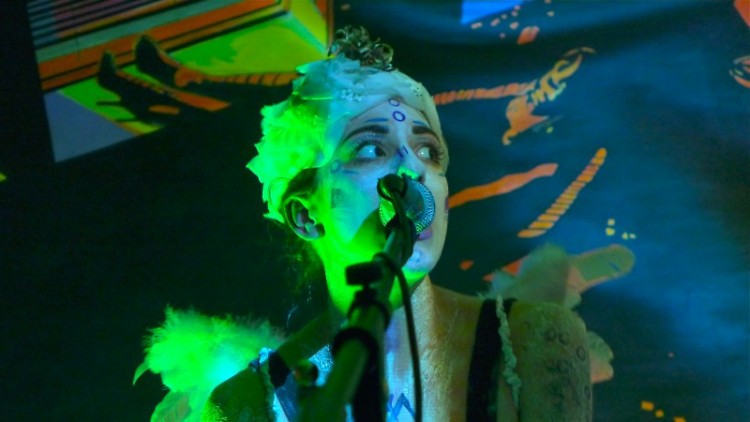Hugo Claudin talks about his community work and events at Mexicains Sans Frontieres.
How did Mexicains Sans Frontieres get started?
“Mexicains Sans Frontieres started around 2006 when I moved into my loft on the Avenue of the Arts. A friend had told me these spaces were going to open for creative types, I was practically homeless at the time and without a job so I was not really expecting to get in,” Hugo shares.
“I was about to go to Mexico for Christmas and I started the application process before I left. I ended up picking up a job there in Todos Santos. When I got back, I was hired at a hospital doing outreach in the Hispanic community. Before that I had done some booking work at Arco Iris over on Bridge Street. I had been given full creative reign to bring in whatever I wanted.”
Hugo started booking Chicago free improv groups and AACM events. “Soon after, we hit a great opportunity by booking a band called Birth. Birth had just studied with Anthony Braxton and they hooked us up with the downtown New York scene.” Here they hosted great acts from Brooklyn and the Knitting Factory. “I established contacts with musicians from all over the world from there.”
How has Mexicains Sans Frontieres progressed?
“Mexicains Sans Frontieres was an extension of the work I did at Arco Iris. When [Acros Iris] closed, I took the brand name and created ‘Arco Iris on the Run.’” Hugo did shows anywhere he could, from coffee houses to art places. He had the contact sheet he had built over the years and continued to book acts.
“I was offered the opportunity to design some graphics for the Mexican Festival and did with the condition that I use the Mexican Wrestling theme I had been working with. I made a variation of that style to fit my new themes. ‘Women on the Verge of Kicking Your Ass’ was the line of paintings I started working on at that time and the immigrant population was under lots of duress. Mexicans Without Borders was already in use by several HIV organizations on the border states and I just turned that phrase to French. I used that as a poke in the eye of the popular culture. I could not think of a more irreverent name.”
What is your involvement with Avenue for the Arts and the community and how has Mexicains Sans Frontieres strengthened the community?
“Early on I attended the Avenue of the Arts meetings. Back then, the DAAC was still around as well as the Mixtape. I shared a lot of the same clientele as Morning Star coffeehouse at the time. With the DAAC gone now, and the other youth driven stops, we lost great momentum.
Hugo partnered with Brandon Copeland (Dante Cope) to co-produce a series of house shows featuring electronic music. It was an intentional move on their part to mix the audiences. “My main complaint was that we were attracting mostly white college students and we wanted to broaden the audience to reflect more of the underground communities make up. I partnered with the Avenue on a series of concerts to keep the benches at Pekich Park since some community members felt that the benches attracted unsavory characters to the corner. I thought otherwise so my big mouth got me working on building awareness around that. Neighborhood Revitalization Specialist with Dwelling Place Jenn Schaub and I continue in our effort to make this a great creative community.”
What are some of your favorite music events or artists you've hosted at your space?
“I have had thousands of shows here. Some very memorable ones were done with the help of Dan Climie, Uriah Maczala, and others. I really loved having Xenia Rubinos, who was just about to blow up. I have had hundreds of jazz concerts. Among the more important: saxophonist Tony Malaby, bassist Mark Helias, percussionist Adam Rudolph, percussionist Tatsuya Nakatani, Japanese noise artist Hiroshi Hasegawa, multi-instrumentalist Cooper Moore, French guitarist Richard Pinhas, beat poet provocateur John Ross, and many others.”
How do you see your space changing or growing in our current political climate?
“I have a few shows coming up of importance. On March 25, I have internationally known poet Ana Castillo doing a reading and book signing featuring material from her new book Black Dove. On April 19th I will be hosting Naked Dance, a trio from Ann Arbor. Stephen Rush just published a book: Free Jazz Harmolodics and Ornette Coleman. Rush will also release a CD done with Roscoe Mitchell and recorded at Nessa Records. On May 31st I will host a trio featuring Tristan Honsinjer on cello, Joshua Zubot on violin and Nicolas Caloia on double bass.”
Hugo shares, “I think the arts have an extremely important role in teaching about counter-currents and alternative ways to create economies outside of the more commercialized ways that are presented to us for mass consumption. This is not a big production and was never meant to be. I am happy presenting small shows of great quality and social relevance.”
The Rapidian, a program of the 501(c)3 nonprofit Community Media Center, relies on the community’s support to help cover the cost of training reporters and publishing content.
We need your help.
If each of our readers and content creators who values this community platform help support its creation and maintenance, The Rapidian can continue to educate and facilitate a conversation around issues for years to come.
Please support The Rapidian and make a contribution today.
